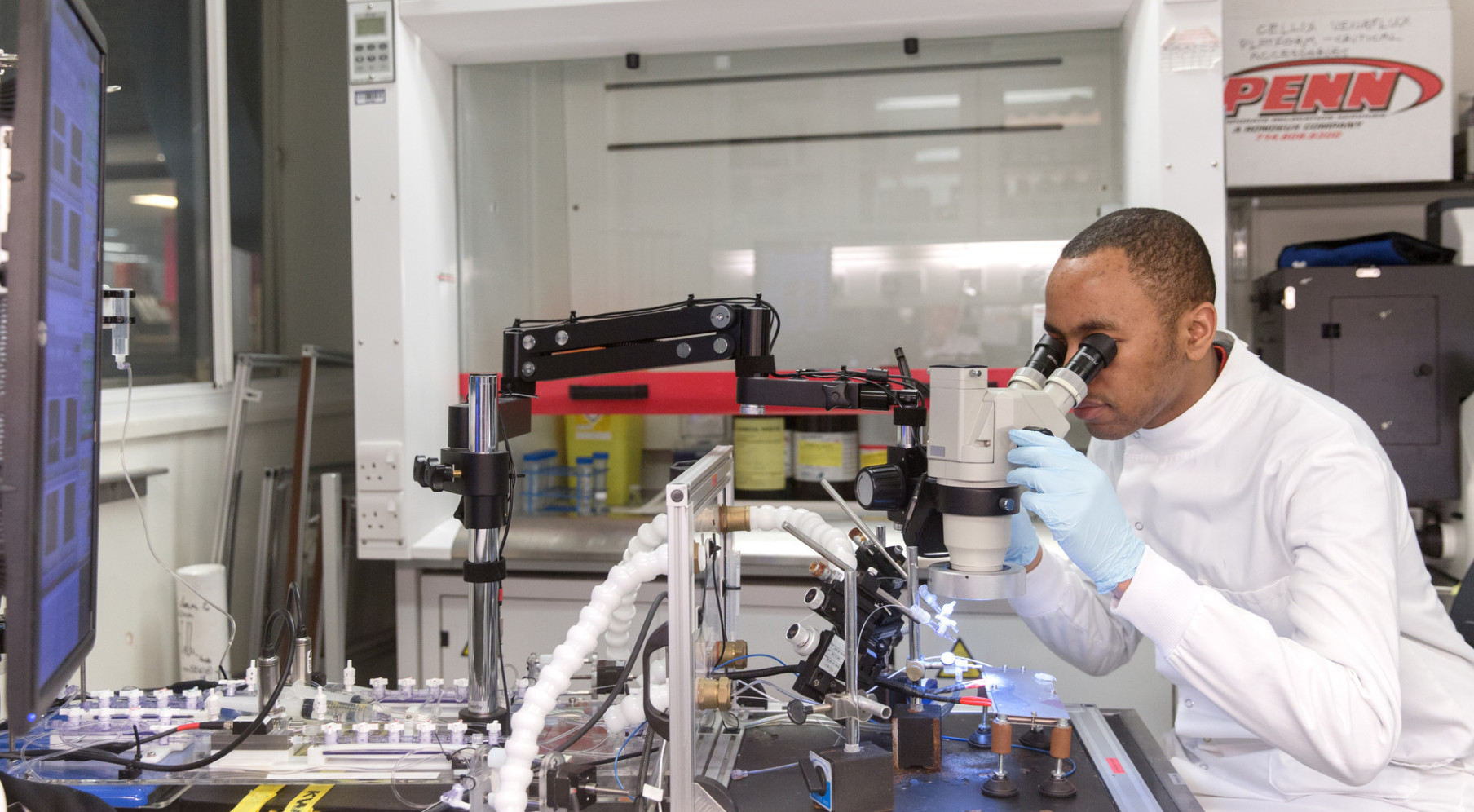MSc Health Data Analytics and Machine Learning

Learn from international experts at the Data Science Institute on this full-time MSc course.
Key information
Duration: 1 year full-time
Start date: October 2022
ECTS: 90 credits
Overview
Our MSc in Health Data Analytics and Machine Learning is a one-year full-time course aimed at building a solid and common background in analysing health data.
Your main objective is to develop skills in using appropriate cutting edge quantitative methods to fully exploit complex and high dimensional data.
The course is delivered in collaboration with the Data Science Institute, with teaching from both the School and Institute undertaken by international experts with strong methodological background and expertise in the application of these approaches to large-scale medical and clinical data. The programme features extensive project-based learning using real data sets and addressing real scientific questions through module-specific projects work, and individual research projects.
This Master’s is integrated in the research priorities of the School of Public Health, the Data Science Institute, the MRC Centre for Environment and Health, the UK Dementia Research Institute, and the pan-London Health Data Research UK initiative, through:
- the contribution to teaching of key staff members (lectures, seminars, journal clubs)
- the definition of research projects stemming from data available and yet under-exploited in each institute
As such, not only the programme will equip students with cutting-edge statistical and machine learning techniques that are required to explore emerging ‘Big’ health data, but will also provide extensive experience in their application in a real-life setting in Environmental, Molecular, Cancer, and Computational epidemiology as well as in Population and Health sciences.
Throughout, teaching will include project-based work. Projects are based on real data and will address real scientific questions from research staff within School of Public Health, Data Science Institute and industrial partners.
Our MSc in Health Data Analytics and Machine Learning is delivered in partnership with the Data Science Institute.
Careers
When you graduate, you will have acquired the strong methodological background needed to perform in-depth analysis of medical and epidemiological high throughput datasets.
You will be well-positioned to pursue further study at doctoral level, become an expert analyst in industry, or join large data companies.
Structure
This page reflects the latest version of the curriculum for this year of entry. However, this information is subject to change.
The curriculum of this programme is currently being reviewed as part of a College-wide process to introduce a standardised modular structure. As a result, the content and assessment structures of this course may change for this year of entry.
We recommend you check this page before finalising your application and again before accepting your offer. We will update this page as soon as any changes are confirmed by the College.
Find out more about the limited circumstances in which we may need to make changes to or in relation to our courses, the type of changes we may make and how we will tell you about any changes made.
Page last reviewed on 25 October 2021.
Structure
Term one
In your first term, you will follow a programme of core modules:
- Introduction to Statistical Thinking and Data Analysis
- Principles and Methods of Epidemiology
- Clinical Data Management
- Molecular Epidemiology
- Translational Data Science Part I
You share your first two modules with MSc Epidemiology and Master of Public Health students, giving you a common foundation in epidemiology.
To help integrate students from a range of backgrounds, you will be offered optional additional workshops on mathematical and statistical principles, and, epidemiological and biological principles.
Term two
In term two, you turn your focus to more sophisticated statistical methods to perform the in-depth analysis of high throughput data, health data at the population level and machine learning approaches to explore ‘big data’. You will also attend a series of research seminars.
- Machine Learning
- Computational Epidemiology
- Translational Data Science Part II
- Population Health Analytics
- Research seminar series
Term two also includes the selection and development of your research project planning.
Term three (Research Project)
Your third term is predominantly focused on your four-month research project. This project is designed for you to apply the advanced techniques you have been taught to real data sets.
Throughout this project, you will be guided through all the steps of the process. From conceiving and delivering (and assessing) a high standard scientific publication.
Teaching and assessment
Teaching methods
- Lectures and practicals
- Seminars and technical tutorials
- Small group tutorials
- Group work sessions
- Computer-based practical workshops
- Group revision sessions
- Group mini research projects including an oral presentation of the results and/or production of a written report
- Preparation and peer-evaluation of a scientific paper and corresponding presentation
- Individual research project
Lecture materials, assessment information and practical question and answers will be made available on Imperial's Virtual Learning Environment.
Assessment methods
- Written examinations
- Oral presentations
- Online quizzes
- Short answer essay questions
- Real case analyses reports
- Final research paper
- Research plan
- Project journal and log
Events, tasters and talks
Find out more about studying at Imperial by meeting us at a virtual event. From webinars and study fairs to drop-ins and open days. Join us throughout the year for a range of events.
Explore all of our upcoming events.
Entry requirements
We welcome students from all over the world and consider all applicants on an individual basis.
Admissions
Minimum academic requirement
Our minimum requirement is a 2.1 degree in mathematics, statistics, epidemiology or biology, or a medical degree.
International qualifications
We also accept a wide variety of international qualifications.
The academic requirement above is for applicants who hold or who are working towards a UK qualification.
For guidance see our Country Index though please note that the standards listed are the minimum for entry to the College, and not specifically this Department.
If you have any questions about admissions and the standard required for the qualification you hold or are currently studying then please contact the relevant admissions team.
English language requirement (all applicants)
All candidates must demonstrate a minimum level of English language proficiency for admission to the College.
For admission to this course, you must achieve the higher College requirement in the appropriate English language qualification. For details of the minimum grades required to achieve this requirement, please see the English language requirements for postgraduate applicants.
How to apply
Making an application
Apply online
All applicants must apply online.
Visit our Admissions website for details on the application process.
You can submit one application form per year of entry. You can usually choose up to two courses.
Application fee
If you are applying for a taught Master’s course, you will need to pay an application fee before submitting your application.
The fee applies per application and not per course:
- £80 for taught Master's applications (excluding MBAs)
- £135 for MBA applications
There is no application fee for MRes courses, Postgraduate Certificates, Postgraduate Diplomas or research courses, such as PhDs and EngDs.
If you are facing financial hardship and are unable to pay the application fee, we encourage you to apply for our application fee waiver.
ATAS certificate
An ATAS certificate is not required for overseas students applying for this course.
Further questions?
Find answers to your questions about admissions. Answers cover COVID-19, English language requirements, visas and more.
Tuition fees and funding
The level of tuition fees you pay is based on your fee status, which we assess based on UK government legislation.
Find out more about fees and funding opportunities.
Tuition fees
Home rate of tuition
2022 entry
£13,000
Fees are charged by year of entry to the College and not year of study.
Except where otherwise indicated, the fees for students on courses lasting more than one year will increase annually by an amount linked to inflation, including for part-time students on modular programmes. The measure of inflation used will be the Retail Price Index (RPI) value in the April of the calendar year in which the academic session starts e.g. the RPI value in April 2022 will apply to fees for the academic year 2022–2023.
Fee status
Whether you pay the Home fee depends on your fee status.
Your fee status is assessed based on UK Government legislation and includes things like where you live and your nationality or residency status.
Find out more about how we assess your fee status.
EU/EEA/Swiss students
The Government has confirmed that EU/EEA/Swiss students who begin a course before the 31 July 2021 will be eligible to pay the same fee as Home students and have access to student finance for the duration of their course, as long as they meet certain requirements which are unchanged from previous years. This includes students who begin the course remotely.
EU/EEA/Swiss students starting a course on or after 1 August 2021 will no longer be eligible for the Home fee rate and so will be charged the Overseas fee. Please note, we do not expect this to apply to Irish students or students benefitting from Citizens' Rights under the EU Withdrawal Agreement, EEA EFTA Separation Agreement or Swiss Citizens' Rights Agreement respectively. However, we are currently awaiting the formal publication of the amended Fees and Awards regulations.
The UK Council for International Student Affairs (UKCISA) website has useful information on the conditions you currently need to meet to be entitled to pay tuition fees at the Home rate for study on a higher education course in England and reflect the regulations as they currently stand (not the amended regulations which are subject to publication).
Overseas rate of tuition
2022 entry
£37,800
Fees are charged by year of entry to the College and not year of study.
Except where otherwise indicated, the fees for students on courses lasting more than one year will increase annually by an amount linked to inflation, including for part-time students on modular programmes. The measure of inflation used will be the Retail Price Index (RPI) value in the April of the calendar year in which the academic session starts e.g. the RPI value in April 2022 will apply to fees for the academic year 2022–2023.
Fee status
Whether you pay the Overseas fee depends on your fee status.
Your fee status is assessed based on UK Government legislation and includes things like where you live and your nationality or residency status.
Find out more about how we assess your fee status.
EU/EEA/Swiss students
The Government has confirmed that EU/EEA/Swiss students who begin a course before the 31 July 2021 will be eligible to pay the same fee as Home students and have access to student finance for the duration of their course, as long as they meet certain requirements which are unchanged from previous years. This includes students who begin the course remotely.
EU/EEA/Swiss students starting a course on or after 1 August 2021 will no longer be eligible for the Home fee rate and so will be charged the Overseas fee. Please note, we do not expect this to apply to Irish students or students benefitting from Citizens' Rights under the EU Withdrawal Agreement, EEA EFTA Separation Agreement or Swiss Citizens' Rights Agreement respectively. However, we are currently awaiting the formal publication of the amended Fees and Awards regulations.
The UK Council for International Student Affairs (UKCISA) website has useful information on the conditions you currently need to meet to be entitled to pay tuition fees at the Home rate for study on a higher education course in England and reflect the regulations as they currently stand (not the amended regulations which are subject to publication).
Postgraduate Master's loan
If you're a UK national, or EU national with settled or pre-settled status under the EU Settlement Scheme, you may be able to apply for a Postgraduate Master’s Loan from the UK government, if you meet certain criteria.
For 2022-23 entry, the maximum amount is £11,836. The loan is not means-tested and you can choose whether to put it towards your tuition fees or living costs.
Scholarships
We offer a range of scholarships for postgraduate students to support you through your studies.
See what opportunities you may be eligible for:
Accommodation and living costs
Living costs, including accommodation, are not included in your tuition fees.
You can compare costs across our different accommodation options on our Accommodation website.
A rough guide to what you might expect to spend to live in reasonable comfort in London is available on our Fees and Funding website.
Further information

Got a question?
Email: msc-health-data-sph@imperial.ac.uk
Read more about the School and our research in the School of Public Health.

Sign up for our newsletter
Receive regular updates with useful information about studying with us.

Terms and conditions
There are some important pieces of information you should be aware of when applying to universities. We've put together this information in a dedicated section of our website.
Read our terms and conditions for these areas:


